formerly eScholarship Editions


|
|
|
|
Your search for
'Medicine' in subject
found 76 book(s). | Modify Search | Displaying 1 - 20 of 76 book(s) | |
| 1. | 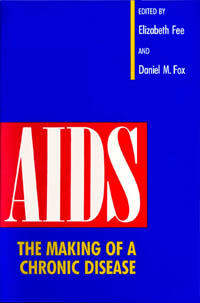 | Title: AIDS: the making of a chronic disease Author: Fee, Elizabeth Published: University of California Press, 1991 Subjects: History | Medicine | United States History | Sociology Publisher's Description: When AIDS was first recognized in 1981, most experts believed that it was a plague, a virulent unexpected disease. They thought AIDS, as a plague, would resemble the great epidemics of the past: it would be devastating but would soon subside, perhaps never to return. By the middle 1980s, however, it became increasingly clear that AIDS was a chronic infection, not a classic plague.In this follow-up to AIDS: The Burdens of History , editors Elizabeth Fee and Daniel M. Fox present essays that describe how AIDS has come to be regarded as a chronic disease. Representing diverse fields and professions, the twenty-three contributors to this work use historical methods to analyze politics and public policy, human rights issues, and the changing populations with HIV infection. They examine the federal government's testing of drugs for cancer and HIV, and show how the policy makers' choice of a specific historical model (chronic disease versus plague) affected their decisions. A powerful photo essay reveals the strengths of women from various backgrounds and lifestyles who are coping with HIV. A sensitive account of the complex relationships of the gay community to AIDS is included. Finally, several contributors provide a sampling of international perspectives on the impact of AIDS in other nations. [brief] Similar Items |
| 2. | 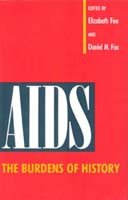 | Title: AIDS: the burdens of history Author: Fee, Elizabeth Published: University of California Press, 1988 Subjects: Medicine | Science Publisher's Description: The AIDS epidemic has posed more urgent historical questions than any other disease of modern times. How have societies responded to epidemics in the past? Why did the disease emerge when and where it did? How has it spread among members of particular groups? And how will the past affect the future - in particular, what does the history of medical science and public health tell us about our ability to control the epidemic and eventually to cure the disease?Historical methods of inquiry change, and people who use these methods often disagree on theory and practice. Indeed, the contributors to this volume hold a variety of opinions on controversial historiographic issues. But they share three important principles: cautious adherence to the "social constructionist" view of past and present; profound skepticism about historicism's idea of progress; and wariness about "presentism," the distortion of the past by seeing it only from the point of view of the present.Each of the twelve essays addresses an aspect of the burdens of history during the AIDS epidemic. By "burdens" is meant the inescapable significance of events in the past for the present. All of these events are related in some way to the current epidemic and can help clarify the complex social and cultural responses to the crisis of AIDS.This collection illuminates present concerns directly and forcefully without sacrificing attention to historical detail and to the differences between past and present situations. It reminds us that many of the issues now being debated - quarantine, exclusion, public needs and private rights - have their parallels in the past. This will be an important book for social historians and general readers as well as for historians of medicine. [brief] Similar Items |
| 3. | 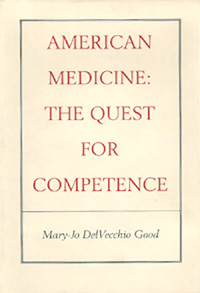 | Title: American medicine: the quest for competence Author: Good, Mary-Jo DelVecchio Published: University of California Press, 1995 Subjects: Medicine | Science | Medical Anthropology | Public Policy Publisher's Description: What does it mean to be a good doctor in America today? How do such challenges as new biotechnologies, the threat of malpractice suits, and proposed health-care reform affect physicians' ability to provide quality care?These and many other crucial questions are examined in this book, the first to fully explore the meaning and politics of competence in modern American medicine. Based on Mary-Jo DelVecchio Good's recent ethnographic studies of three distinct medical communities - physicians in rural California, academics and students involved in Harvard Medical School's innovative "New Pathway" curriculum, and oncologists working on breast cancer treatment - the book demonstrates the centrality of the issue of competence throughout the medical world. Competence, it shows, provides the framework for discussing the power struggles between rural general practitioners and specialists, organizational changes in medical education, and the clinical narratives of high-technology oncologists. In their own words, practitioners, students, and academics describe what competence means to them and reveal their frustration with medical-legal institutions, malpractice, and the limitations of peer review and medical training.Timely and provocative, this study is essential reading for medical professionals, academics, anthropologists, and sociologists, as well as health-care policymakers. [brief] Similar Items |
| 4. |  | Title: Beriberi, white rice, and vitamin B: a disease, a cause, and a cure Author: Carpenter, Kenneth J. (Kenneth John) 1923- Published: University of California Press, 2000 Subjects: Science | Medicine Publisher's Description: In this comprehensive account of the history and treatment of beriberi, Kenneth Carpenter traces the decades of medical and chemical research that solved the puzzle posed by this mysterious disease. Caused by the lack of a minute quantity of the chemical thiamin, or vitamin B1 in the diet, beriberi is characterized by weakness and loss of feeling in the feet and legs, then swelling from fluid retention, and finally heart failure. Western doctors working in Asia after 1870 saw it as the major disease in native armed forces and prisons. It was at first attributed to miasms (poisonous vapors from damp soil) or to bacterial infections. In Java, chickens fed by chance on white rice lost the use of their legs. On brown rice, where the grain still contained its bran and germ, they remained healthy. Studies in Javanese prisons then showed beriberi also occurring where white (rather than brown) rice was the staple food. Birds were used to assay the potency of fractions extracted from rice bran and, after 20 years, highly active crystals were obtained. In another 10 years their structure was determined and "thiamin" was synthesized. Beriberi is a story of contested knowledge and erratic scientific pathways. It offers a fascinating chronicle of the development of scientific thought, a history that encompasses public health, science, diet, trade, expanding empires, war, and technology. [brief] Similar Items |
| 5. | 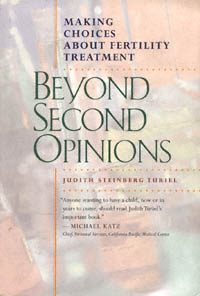 | Title: Beyond second opinions: making choices about fertility treatment Author: Turiel, Judith Steinberg 1948- Published: University of California Press, 1998 Subjects: Science | Sociology | Gender Studies | Medicine Publisher's Description: Beyond Second Opinions is both an exposé of the risks, errors, and distortions surrounding fertility medicine and an authoritative guide for people seeking treatment. Accessible, comprehensive, and extremely well-informed, this book takes the reader beyond hype to the hard data on diagnoses and treatments. Judith Steinberg Turiel, a consumer health activist and herself a veteran of fertility treatments, uses the most up-to-date medical literature to shed new light on difficult decisions patients face today and on reproductive questions society must begin to address now. Those who are seeking a more balanced perspective to help them make better, more informed decisions will find a wealth of information about current reproductive interventions - from simple fertility pills to dazzling experimental options - as well as a discussion of the non-medical forces (economic and political) that shape an individual's treatment choices and reproductive outcomes. Despite quantities of information showered upon patients, they remain woefully misinformed; some fertility treatments may actually reduce chances for a successful pregnancy and threaten a patient's health. Turiel looks beyond surface claims to the real information, often uncovering counterintuitive findings and sometimes scandalous revelations. She exposes a realm of unregulated expansion, unscientific experimentation, and recent scandal over stolen embryos. Weaving together first-hand accounts, compelling stories, a range of scientific information, and lively anecdotes, Turiel addresses the persistent gulfs that separate medical professionals and health care consumers. In the process she arms laypeople with what they might not learn about infertility practices from doctors, patient education brochures, and the newspaper. [brief] Similar Items |
| 6. |  | Title: Big doctoring in America: profiles in primary care Author: Mullan, Fitzhugh Published: University of California Press, 2002 Subjects: Medicine | Health Care | Sociology Publisher's Description: The general practitioner was once America's doctor. The GP delivered babies, removed gallbladders, and sat by the bedsides of the dying. But as the twentieth century progressed, the pattern of medical care in the United States changed dramatically. By the 1960s, the GP was almost extinct. The later part of the twentieth century, however, saw a rebirth of the idea of the GP in the form of primary care practitioners. In this engrossing collection of oral histories and provocative essays about the past and future of generalism in health care, Fitzhugh Mullan - a pediatrician, writer, and historian - argues that primary care is a fascinating, important, and still endangered calling. In conveying the personal voices of primary care practitioners, Mullan sheds light on the political and economic contradictions that confront American medicine. Mullan interviewed dozens of primary care practitioners - family physicians, internists, pediatricians, nurse practitioners, and physician assistants - asking them about their lives and their work. He explains how, during the last forty years, the primary care movement has emerged built on the principles of "big doctoring"--coordinated, comprehensive care over time. This book is essential reading for understanding core issues of the current health care dilemma. As our country struggles with managed care, market reforms, and cost containment strategies in medicine, Big Doctoring in America provides an engrossing and illuminating look at those in the trenches of the profession. [brief] Similar Items |
| 7. |  | Title: Birth as an American rite of passage Author: Davis-Floyd, Robbie Published: University of California Press, 1992 Subjects: Anthropology | Medical Anthropology | Women's Studies | Cultural Anthropology | Medicine | Gender Studies Publisher's Description: Why do so many American women allow themselves to become enmeshed in the standardized routines of technocratic childbirth - routines that can be insensitive, unnecessary, and even unhealthy? And why, in spite of the natural childbirth movement, has hospital birth become even more intensely technologized? Robbie Davis-Floyd argues that these obstetrical procedures are rituals that reflect a cultural belief in the superiority of science over nature. Her interviews with 100 mothers and many health care professionals reveal in detail both the trauma and the satisfaction women derive from childbirth. She also calls for greater cultural and medical tolerance of the alternative beliefs of women who choose to birth at home. [brief] Similar Items |
| 8. | 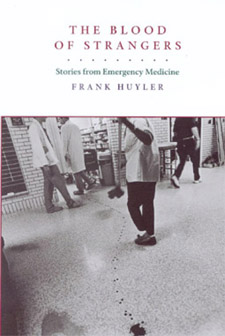 | Title: The blood of strangers: stories from emergency medicine Author: Huyler, Frank 1964- Published: University of California Press, 1999 Subjects: Medicine | American Literature | Autobiography Publisher's Description: Reminiscent of Chekhov's stories, The Blood of Strangers is a visceral portrayal of a physician's encounters with the highly charged world of an emergency room. In this collection of spare and elegant stories, Dr. Frank Huyler reveals a side of medicine where small moments - the intricacy of suturing a facial wound, the bath a patient receives from her husband and daughter - interweave with the lives and deaths of the desperately sick and injured. The author presents an array of fascinating characters, both patients and doctors - a neurosurgeon who practices witchcraft, a trauma surgeon who unexpectedly commits suicide, a wounded murderer, a man chased across the New Mexico desert by a heat-seeking missile. At times surreal, at times lyrical, at times brutal and terrifying, The Blood of Strangers is a literary work that emerges from one of the most dramatic specialties of modern medicine. This deeply affecting first book has been described by one early reader as "the best doctor collection I have seen since William Carlos Williams's The Doctor Stories ." [brief] Similar Items |
| 9. |  | Title: Blood saga: hemophilia, AIDS, and the survival of a community Author: Resnik, Susan 1940- Published: University of California Press, 1999 Subjects: Science | Sociology | Medicine | Anthropology Publisher's Description: For thousands of years boys known as "bleeders" faced an early, painful death from hemophilia. Dubbed "the Royal Disease" because of its identification with Queen Victoria, the world's most renowned carrier, hemophilia is a genetic disease whose sufferers had little recourse until the mid-twentieth century. In the first book to chronicle the emergence and transformation of the hemophilia community, Susan Resnik sets her story within our national political landscape - where the disease is also a social, psychological, and economic experience. Blood Saga includes many players and domains: men with hemophilia and their families, medical personnel, science researchers, and the author herself, who was Director of Education of the National Hemophilia Foundation in the early 1980s. At that time the "miracle treatment" of freeze-dried pooled plasma blood products enabled men with hemophilia to lead full, normal lives. Then the AIDS virus infiltrated the treatment system and over fifty percent of the hemophilia community became HIV-positive. But rather than collapsing, this community refocused its priorities, extended its reach, and helped shape blood safety policies to prevent further tragedy.The hemophilia community includes people from every socioeconomic and ethnic group, and Resnik's narrative and use of oral histories never lose touch with those affected by the disease. Her extensive informant interviewing allows much of this social history to be told by participants on all levels: parents, wives, nurses, doctors, government agency directors, health care providers, and many others.Gene insertion therapy now holds the promise of a cure for hemophilia in the near future. Scientific breakthroughs inevitably become intertwined with the industry and academic medical centers that govern the national health care system. And in that system, says Resnik, costs and safety are sometimes contending issues. She makes clear that the lessons learned in Blood Saga apply to all of us. [brief] Similar Items |
| 10. |  | Title: The caregiving dilemma: work in an American nursing home Author: Foner, Nancy 1945- Published: University of California Press, 1994 Subjects: Anthropology | Medical Anthropology | Social Problems | Medicine | Women's Studies Publisher's Description: Along with increasing life expectancy comes the knowledge that many Americans will one day enter nursing homes. Who are the people who will care for us or for our relatives? Nancy Foner provides a major study of institutional care that focuses on nursing aides, who are the backbone of American nursing homes. She examines the strains and paradoxes facing nursing aides - asked, on the one hand, to provide compassionate care and, on the other, to cope with the pressures of the workplace and the institution.Aides are expected to look after patients, who are predominantly older women, with kindness and consideration, but nursing home regulations and bureaucratic forces often hinder even the best efforts to offer consistently supportive care. Positioned at the bottom of the nursing hierarchy, aides must cope with the needs of frail, dependent residents, pressures from patients' relatives and from their own families, and demands of supervisors and coworkers.Foner's detailed description and analysis of caregiving dilemmas, based on intensive field research in a New York facility, brings the perspective of the nursing aides to the fore. This is a timely contribution to the study of work, bureaucracy, and the future of an aging American population. [brief] Similar Items |
| 11. |  | Title: Childbirth and authoritative knowledge: cross-cultural perspectives Author: Davis-Floyd, Robbie Published: University of California Press, 1997 Subjects: Anthropology | Women's Studies | Medicine Publisher's Description: This benchmark collection of cross-cultural essays on reproduction and childbirth extends and enriches the work of Brigitte Jordan, who helped generate and define the field of the anthropology of birth. The authors' focus on authoritative knowledge - the knowledge that counts, on the basis of which decisions are made and actions taken - highlights the vast differences between birthing systems that give authority of knowing to women and their communities and those that invest it in experts and machines. Childbirth and Authoritative Knowledge offers first-hand ethnographic research conducted by anthropologists in sixteen different societies and cultures and includes the interdisciplinary perspectives of a social psychologist, a sociologist, an epidemiologist, a staff member of the World Health Organization, and a community midwife. Exciting directions for further research as well as pressing needs for policy guidance emerge from these illuminating explorations of authoritative knowledge about birth. This book is certain to follow Jordan's Birth in Four Cultures as the definitive volume in a rapidly expanding field. [brief] Similar Items |
| 12. | 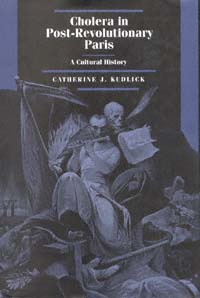 | Title: Cholera in post-revolutionary Paris: a cultural history Author: Kudlick, Catherine Jean Published: University of California Press, 1996 Subjects: History | European History | Medicine Publisher's Description: Cholera terrified and fascinated nineteenth-century Europeans more than any other modern disease. Its symptoms were gruesome, its sources were mysterious, and it tended to strike poor neighborhoods hardest. In this insightful cultural history, Catherine Kudlick explores the dynamics of class relations through an investigation of the responses to two cholera epidemics in Paris.While Paris climbed toward the height of its urban and industrial growth, two outbreaks of the disease ravaged the capital, one in 1832, the other in 1849. Despite the similarity of the epidemics, the first outbreak was met with general frenzy and far greater attention in the press, popular literature and personal accounts, while the second was greeted with relative silence. Finding no compelling evidence for improved medical knowledge, changes in the Paris environment, or desensitization of Parisians, Kudlick looks to the evolution of the French revolutionary tradition and the emergence of the Parisian bourgeoisie for answers. [brief] Similar Items |
| 13. |  | Title: The cigarette papers Author: Glantz, Stanton A Published: University of California Press, 1998 Subjects: Politics | Medicine | Public Policy | Law | United States History Publisher's Description: Around-the-clock tobacco talks, multibillion-dollar lawsuits against the major cigarette companies, and legislative wrangling over how much to tax a pack of cigarettes - these are some of the most recent episodes in the war against the tobacco companies. The Cigarette Papers shows what started it all: revelations that tobacco companies had long known the grave dangers of smoking, and did nothing about it.In May 1994 a box containing 4,000 pages of internal tobacco industry documents arrived at the office of Professor Stanton Glantz at the University of California, San Francisco. The anonymous source of these "cigarette papers" was identified only as "Mr. Butts." These documents provide a shocking inside account of the activities of one tobacco company, Brown & Williamson, over more than thirty years. Quoting extensively from the documents themselves and analyzing what they reveal, The Cigarette Papers shows what the tobacco companies have known and galvanizes us to take action. [brief] Similar Items |
| 14. | 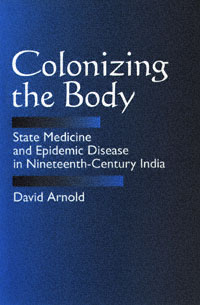 | Title: Colonizing the body: state medicine and epidemic disease in nineteenth-century India Author: Arnold, David 1946- Published: University of California Press, 1993 Subjects: Asian Studies | South Asia | Asian History | Medicine | History Publisher's Description: In this innovative analysis of medicine and disease in colonial India, David Arnold explores the vital role of the state in medical and public health activities, arguing that Western medicine became a critical battleground between the colonized and the colonizers.Focusing on three major epidemic diseases - smallpox, cholera, and plague - Arnold analyzes the impact of medical interventionism. He demonstrates that Western medicine as practiced in India was not simply transferred from West to East, but was also fashioned in response to local needs and Indian conditions.By emphasizing this colonial dimension of medicine, Arnold highlights the centrality of the body to political authority in British India and shows how medicine both influenced and articulated the intrinsic contradictions of colonial rule. [brief] Similar Items |
| 15. | 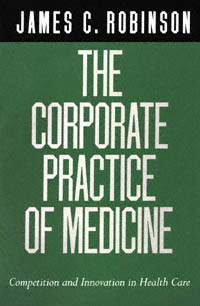 | Title: The corporate practice of medicine: competition and innovation in health care Author: Robinson, James C 1953- Published: University of California Press, 1999 Subjects: Politics | Public Policy | Medicine | Economics and Business Publisher's Description: One of the country's leading health economists presents a provocative analysis of the transformation of American medicine from a system of professional dominance to an industry under corporate control. James Robinson examines the economic and political forces that have eroded the traditional medical system of solo practice and fee-for-service insurance, hindered governmental regulation, and invited the market competition and organizational innovations that now are under way. The trend toward health care corporatization is irreversible, he says, and it parallels analogous trends toward privatization in the world economy.The physician is the key figure in health care, and how physicians are organized is central to the health care system, says Robinson. He focuses on four forms of physician organization to illustrate how external pressures have led to health care innovations: multispecialty medical groups, Independent Practice Associations (IPAs), physician practice management firms, and physician-hospital organizations. These physician organizations have evolved in the past two decades by adopting from the larger corporate sector similar forms of ownership, governance, finance, compensation, and marketing.In applying economic principles to the maelstrom of health care, Robinson highlights the similarities between competition and consolidation in medicine and in other sectors of the economy. He points to hidden costs in fee-for-service medicine - overtreatment, rampant inflation, uncritical professional dominance regarding treatment decisions - factors often overlooked when newer organizational models are criticized.Not everyone will share Robinson's appreciation for market competition and corporate organization in American health care, but he challenges those who would return to the inefficient and inequitable era of medicine from which we've just emerged. Forcefully written and thoroughly documented, The Corporate Practice of Medicine presents a thoughtful - and optimistic - view of a future health care system, one in which physician entrepreneurship is a dynamic component. [brief] Similar Items |
| 16. | 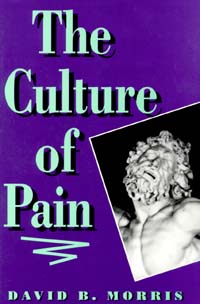 | Title: The culture of pain Author: Morris, David B Published: University of California Press, 1991 Subjects: Science | Medicine | Literature | History Similar Items |
| 17. |  | Title: Deceit and denial: the deadly politics of industrial pollution Author: Markowitz, Gerald E Published: University of California Press, 2002 Subjects: Medicine | Health Care | Public Policy | United States History Publisher's Description: Deceit and Denial details the attempts by the chemical and lead industries to deceive Americans about the dangers that their deadly products present to workers, the public, and consumers. Gerald Markowitz and David Rosner pursued evidence steadily and relentlessly, interviewed the important players, investigated untapped sources, and uncovered a bruising story of cynical and cruel disregard for health and human rights. This resulting exposé is full of startling revelations, provocative arguments, and disturbing conclusions--all based on remarkable research and information gleaned from secret industry documents. This book reveals for the first time the public relations campaign that the lead industry undertook to convince Americans to use its deadly product to paint walls, toys, furniture, and other objects in America's homes, despite a wealth of information that children were at risk for serious brain damage and death from ingesting this poison. This book highlights the immediate dangers ordinary citizens face because of the relentless failure of industrial polluters to warn, inform, and protect their workers and neighbors. It offers a historical analysis of how corporate control over scientific research has undermined the process of proving the links between toxic chemicals and disease. The authors also describe the wisdom, courage, and determination of workers and community members who continue to voice their concerns in spite of vicious opposition. Readable, pathbreaking, and revelatory, Deceit and Denial provides crucial answers to questions of dangerous environmental degradation, escalating corporate greed, and governmental disregard for its citizens' safety and health. [brief] Similar Items |
| 18. | 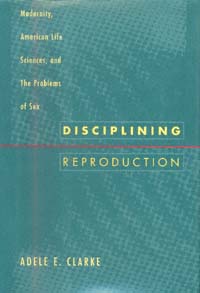 | Title: Disciplining reproduction: modernity, American life sciences, and "the problems of sex" Author: Clarke, Adele Published: University of California Press, 1998 Subjects: Sociology | Medical Anthropology | Medicine | American Studies | Gender Studies Publisher's Description: Reproductive issues from sex and contraception to abortion and cloning have been controversial for centuries, and scientists who attempted to turn the study of reproduction into a discipline faced an uphill struggle. Adele Clarke's engrossing story of the search for reproductive knowledge across the twentieth century is colorful and fraught with conflict.Modern scientific study of reproduction, human and animal, began in the United States in an overlapping triad of fields: biology, medicine, and agriculture. Clarke traces the complicated paths through which physiological approaches to reproduction led to endocrinological approaches, creating along the way new technoscientific products from contraceptives to hormone therapies to new modes of assisted conception - for both humans and animals. She focuses on the changing relations and often uneasy collaborations among scientists and the key social worlds most interested in their work - major philanthropists and a wide array of feminist and medical birth control and eugenics advocates - and recounts vividly how the reproductive sciences slowly acquired standing.By the 1960s, reproduction was disciplined, and the young and contested scientific enterprise proved remarkably successful at attracting private funding and support. But the controversies continue as women - the targeted consumers - create their own reproductive agendas around the world. Elucidating the deep cultural tensions that have permeated reproductive topics historically and in the present, Disciplining Reproduction gets to the heart of the twentieth century's drive to rationalize reproduction, human and nonhuman, in order to control life itself. [brief] Similar Items |
| 19. | 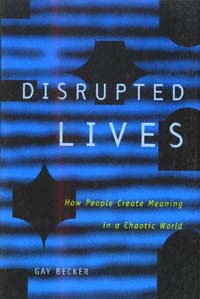 | Title: Disrupted lives: how people create meaning in a chaotic world Author: Becker, Gaylene Published: University of California Press, 1998 Subjects: Anthropology | Medicine | Sociology Publisher's Description: Our lives are full of disruptions, from the minor - a flat tire, an unexpected phone call - to the fateful - a diagnosis of infertility, an illness, the death of a loved one. In the first book to examine disruption in American life from a cultural rather than a psychological perspective, Gay Becker follows hundreds of people to find out what they do after something unexpected occurs. Starting with bodily distress, she shows how individuals recount experiences of disruption metaphorically, drawing on important cultural themes to help them reestablish order and continuity in their lives. Through vivid and poignant stories of people from different walks of life who experience different types of disruptions, Becker examines how people rework their ideas about themselves and their worlds, from the meaning of disruption to the meaning of life itself.Becker maintains that to understand disruption, we must also understand cultural definitions of normalcy. She questions what is normal for a family, for health, for womanhood and manhood, and for growing older. In the United States, where life is expected to be orderly and predictable, disruptions are particularly unsettling, she contends. And, while continuity in life is an illusion, it is an effective one because it organizes people's plans and expectations.Becker's phenomenological approach yields a rich, compelling, and entirely original narrative. Disrupted Lives acknowledges the central place of discontinuity in our existence at the same time as it breaks new ground in understanding the cultural dynamics that underpin life in the United States. FROM THE BOOK :"The doctor was blunt. He does not mince words. He did a [semen] analysis and he came back and said, 'This is devastatingly poor.' I didn't expect to hear that. It had never occurred to me. It was such a shock to my sense of self and to all these preconceptions of my manliness and virility and all of that. That was a very, very devastating moment and I was dumbfounded. . . . In that moment it totally changed the way that I thought of myself." [brief] Similar Items |
| 20. |  | Title: Drug war politics: the price of denial Author: Bertram, Eva Published: University of California Press, 1996 Subjects: Politics | Public Policy | Law | Sociology | Medicine | American Studies Publisher's Description: Why have our drug wars failed and how might we turn things around? Ask the authors of this hardhitting exposè of U.S. efforts to fight drug trafficking and abuse. In a bold analysis of a century's worth of policy failure, Drug War Politics turns on its head many familiar bromides about drug politics. It demonstrates how, instead of learning from our failures, we duplicate and reinforce them in the same flawed policies. The authors examine the "politics of denial" that has led to this catastrophic predicament and propose a basis for a realistic and desperately needed solution.Domestic and foreign drug wars have consistently fallen short because they are based on a flawed model of force and punishment, the authors show. The failure of these misguided solutions has led to harsher get-tough policies, debilitating cycles of more force and punishment, and a drug problem that continues to escalate. On the foreign policy front, billions of dollars have been wasted, corruption has mushroomed, and human rights undermined in Latin America and across the globe. Yet cheap drugs still flow abundantly across our borders. At home, more money than ever is spent on law enforcement, and an unprecedented number of people - disproportionately minorities - are incarcerated. But drug abuse and addiction persist.The authors outline the political struggles that help create and sustain the current punitive approach. They probe the workings of Washington politics, demonstrating how presidential and congressional "out-toughing" tactics create a logic of escalation while the criticisms and alternatives of reformers are sidelined or silenced. Critical of both the punitive model and the legalization approach, Drug War Politics calls for a bold new public health approach, one that frames the drug problem as a public health - not a criminal - concern. The authors argue that only by situating drug issues in the context of our fundamental institutions - the family, neighborhoods, and schools - can we hope to provide viable treatment, prevention, and law enforcement. In its comprehensive investigation of our long, futile battle with drugs and its original argument for fundamental change, this book is essential for every concerned citizen. [brief] Similar Items |